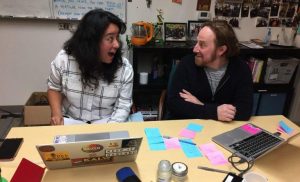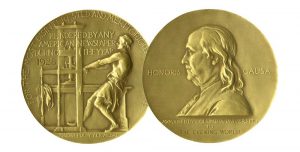KALW Audio Academy Alumni Wins Pulitzer Prize for Audio Journalism While Other Alumni Were Pulitzer Finalists
By Ben Trefny, News Director, KALW, Audience Supported Public Media, and Sarah Lai Stirland, Audio Academy Fellow ‘20
On Monday, May 4, we learned the extraordinary news that a This American Life (TAL) episode about the U.S. “Remain in Mexico” policy had won the first ever Pulitzer Prize for audio journalism. It was a partnership project with the LA Times, and it took a big team of people to pull it together.
Two of those people have roots in KALW‘s training programs.
Lina Misitzis was part of the Audio Academy class of 2015. She worked with us for several months and then got a job offer from Gimlet in New York City where she moved and eventually landed a job as a TAL producer. But first, she wrote this ACE blog post about her experience with KALW. It includes this passage, which foreshadows her work with TAL:
“Here’s the amazing thing I learned after a couple weeks with KALW: no one there makes anything from start to finish, completely and totally by themselves. The team weighs in. Groups of producers listen to each other’s stories together, and critique accordingly. Engineers give reporters advice. Reporters invite volunteers to join them in edits. Everyone is asked to chime in on the morning conference calls. And on and on. I understood, in theory, that stations are a collaborative place. But I had never seen it in practice, and something tells me that KALW isn’t like most stations.”
Another former colleague who was just honored with that collaborative Pulitzer is Abbie Fentress Swanson. She’s Executive Producer of Podcasts and Audio for the LA Times. Back when she was in graduate school at UC Berkeley, she reported stories for KALW, honing her skills with our talented editors and engineers who teach all of our trainees.
What’s more is that this year’s Pulitzers for audio journalism recognized two other programs as finalists. One of them was Ear Hustle, the hit podcast that came out of San Quentin State Prison, featuring hosts and producers taught by KALW. I’m very happy to note that our training work has expanded very successfully to California State Prison, Solano, as well, and we’re applying to work at two prisons in Southern California, now, too.
These honors are indicative of the extraordinary ripples that come out of KALW’s training programs. We couldn’t be prouder, and we’re looking forward to much more!
Our current Audio Academy class is filled with outstanding journalists and storytellers, as well. One is Sarah Lai Stirland. I asked her to share some thoughts with you about what she’s been up to:

Sarah Lai Stirland and KALW Managing News Editor David Boyer share a moment in the newsroom before the shelter-in-place order.
Photo Credit: Ben Trefny
This week, KALW aired one of the most ambitious stories I’ve ever attempted: The story of a 19-year-old high school student who had returned from the brink of suicide to create a local podcast that brings her peers together.
The project I embarked upon was challenging on many levels: It’s a complex one that involves nuanced ideas. It involves a sensitive topic. It also involves many people, pivotal events, and the subject’s family. And it was close to home within my own community. One day, when I was looking someone up in an old edition of my daughter’s elementary school directory, I saw with surprise the mother of my subject staring up at me from the page in an advertisement for her real estate business.
It was a nerve-wracking process of reporting because the podcast’s many episodes themselves revealed some deeply disturbing aspects of members of my community’s lives, even though the interviewees are anonymous. One girl alleged that her parents did not believe her reports of her piano teacher’s lecherous lessons. Another girl reported that the first thing her mother said to her when she visited her daughter in the ER after a suicide attempt was: “How could you do this to me?”
I didn’t know who I would be able to get in touch with, but I wanted to find out more about these kids and what the response of the local community was to all these revelations. Also, the mere existence of the podcast itself was controversial in my mind. In effect, it was like doing therapy in public. What would therapists make of this exercise?
But with the encouragement of my mentor Lisa Morehouse, I went for it. Casey, the story’s protagonist, talked to me for hours, as did the mother of one of the teens in one of the episodes, as did Casey’s parents. They were all incredibly generous with their time and how they opened up their lives to me, and by extension, the wider community. That was one big surprise from this whole exercise — just how open and generous these members of my local community were. Some of the details of their lives that they shared were deeply intimate. But as Casey implies in my story — we’re all flawed human beings, and the point is that to heal, we have to be honest, gentle and non-judgemental with ourselves and others during difficult times. That’s an important and contrarian message in a place as competitive as Silicon Valley.
Through a lot of hard work and pain, I was able to eventually craft a simply-worded story with an elegant structure out of a deeply tangled bramble bush of text and ideas. My invaluable guide on this journey was KALW’s Jenee Darden, a veteran of the world of radio. I’ve been having a hard time telling stories with my voice, and Jenee spent hours with me helping me to escape the trap of sounding like Mr. Peabody in the original 1950s cartoon Mr. Peabody and Sherman.
The result is the story that aired on May 4. Again, it’s very simply worded, but at the same time, I think it captures the complexities and the paradox of living in and raising children in an ultra-competitive and economically-challenging society. As the therapist Christy Hyun said to me at one point, some people around here might have invented things like the Apple Pencil, and own dozens of patents, but have they taken the time to slow down and really get to know their kids?
This story is deeply local and a great story for KALW, but it’s also a universal one that faces all of us as parents: What gets sacrificed in our race to land “the perfect life?”
At the same time as wrapping this story up, I’ve been busy chasing down feature story ideas related to the coronavirus pandemic and producing news spots. All of this has helped me build the mental and physical muscle memory to produce sound and narrative through Pro Tools, a fancy piece of software with so many bells and whistles that it terrified me just a few months ago.
The process of producing the spots has also helped me to think more fluidly as a radio reporter in terms of nailing down the main points and telling stories as simply and efficiently as possible.
It’s been an amazing experience, even if we did have to cut our field reporting duties short.

